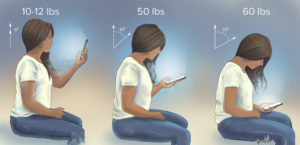CORE Physical Therapy and Sports Performance In Omaha Explains…
By Dr. Mark Rathjen PT DPT CSCS
CORE Physical Therapy Co-owner
17660 Wright St. 9/10
Omaha NE
402-933-4027

The study posted below suggest that physical therapy and corrective exercises will help long term postural of forwards head and shoulder posture. Moreover, in combination with manual therapy, better and longer term outcomes are observed.
We all know that we are spending more time on computers and on our phones. Children younger and younger are spending more time with bad texting posture overall, and this will likely lead to chronic neck pain and non specific neck pain disorders. The earlier this starts in a persons life, the more damage that can be down over a longer time. That being said, that also means we have more of an opportunity to help with this posture syndrome before real damage is done.
Scapular retraction exercises, corrective stretching and manual techniques can lead to real long term benefits for your posture. Contact us at CORE Physical Therapy and Sports Performance in Omaha Nebraska at 402 933 4027. We can fix any issues with posture, strengthening new positions are reinforce new habits, retiring your brain and have great posture as your new default position. Step by Step.

“These findings suggest that both interventions were significantly effective in reducing neck pain and improving function and posture in patients. However, the improvement in function and pain were more effective in Group 1 as compared to Group 2, suggesting that MT can be used as a supplementary method to the stabilizing intervention in the treatment of neck pain. More researches are needed to confirm the result of this study.”
At CORE Physical Therapy in Omaha, We specialize in the treatment of athletes. We have worked with athletes for a combined 30 years. CORE was established in 2015 by Dr. Mark and Dr. Claire Rathjen is family owned and operated.
We are proud to serve the greater Omaha metro area.
For More information, Please feel free to contact us http://coreomaha.com/contact/
Please feel free to follow us at https://www.facebook.com/COREomaha/
To get started http://coreomaha.com/getting-started/
For more Blog information http://coreomaha.com/blog/
Youtube Account linked below.
https://www.youtube.com/channel/UCVg8OSN5h-i1n_ykw1Gvahg?view_as=subscriber
The effect of manual therapy and stabilizing exercises on forward head and rounded shoulder postures: a six-week intervention with a one-month follow-up study
- PMID: 30777064
- PMCID: PMC6379958
- DOI: 10.1186/s12891-019-2438-y
Free PMC article
Abstract
Background: The purpose of this study is to evaluate the effect of a six-week combined manual therapy (MT) and stabilizing exercises (SEs), with a one-month follow-up on neck pain and improving function and posture in patients with forward head and rounded shoulder postures (FHRSP).
Methods: Sixty women with neck pain and FHRSP were randomized into three groups: Group 1 performed SE and received MT (n = 20), Group 2 performed SE (n = 20) and Group 3 performed home exercises (n = 20) for six weeks. The follow-up time was one month after the post test. The pain, function, and head and shoulder angles were measured before and after the six-week interventions, and during a one-month follow-up.
Results: There were significant within-group improvements in pain, function, and head and shoulder posture in groups 1 and 2. There were significant between-group differences in groups 1 and 2 in head posture, pain, and function favoring group 1 with effect size 0.432(p = 0.041), 0.533 (P = 0.038), and 0.565(P = 0.018) respectively. There were significant between-group differences in both intervention groups versus the control group favoring the intervention groups.
Conclusion: These findings suggest that both interventions were significantly effective in reducing neck pain and improving function and posture in patients. However, the improvement in function and pain were more effective in Group 1 as compared to Group 2, suggesting that MT can be used as a supplementary method to the stabilizing intervention in the treatment of neck pain. More researches are needed to confirm the result of this study.
Trial registration: UMIN000030141 modified on 2018.03.08. This study is a randomized control trial registered at UMIN-CTR website, the trial was retrospectively registered and the unique trial number is UMIN000030141 .
Keywords: Forward head posture; Function; Manual therapy; Neck pain; Stabilization exercises.
Conflict of interest statement
Ethics approval and consent to participate
This study was approved by the Research Ethics Committee of the Faculty of Physical Education and Sport Science of the Kharazmi University. The patients were informed about the details of the study and provided written informed consent before study enrollment. Informed consent was obtained from all the participants, and procedures were conducted according to the Declaration of Helsinki.
Consent for publication
Not applicable.
Competing interests
The authors declare that they have no competing interests.
Publisher’s Note
Springer Nature remains neutral with regard to jurisdictional claims in published maps and institutional affiliations.
Similar articles
-
Sports Health. 2019 May/Jun;11(3):272-279. doi: 10.1177/1941738119835223. Epub 2019 Apr 23.PMID: 31013190 Free PMC article. Clinical Trial.
-
Man Ther. 2016 Feb;21:76-82. doi: 10.1016/j.math.2015.05.001. Epub 2015 May 13.PMID: 26028408 Clinical Trial.
-
J Manipulative Physiol Ther. 2017 Jan;40(1):1-10. doi: 10.1016/j.jmpt.2016.10.005. Epub 2016 Nov 11.PMID: 27842938 Clinical Trial.
-
Exercise interventions for shoulder dysfunction in patients treated for head and neck cancer.
Cochrane Database Syst Rev. 2012 Apr 18;(4):CD008693. doi: 10.1002/14651858.CD008693.pub2.PMID: 22513964 Review. -
Cochrane Database Syst Rev. 2015 Feb 13;(2):CD009765. doi: 10.1002/14651858.CD009765.pub2.PMID: 25677413 Review.
